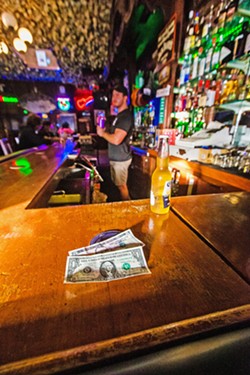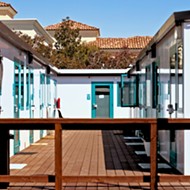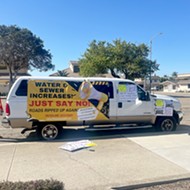[{
"name": "Newsletter Promo",
"id": "NewsletterPromo",
"class": "inlineCenter",
"insertPoint": "4",
"component": "15264767",
"requiredCountToDisplay": "0"
},{
"name": "Ad - Medium Rectangle CC01 - 300x250",
"id": "AdMediumRectangleCC01300x250",
"class": "inlineCenter",
"insertPoint": "8",
"component": "2963441",
"requiredCountToDisplay": "12"
},{
"name": "Ad - Medium Rectangle LC01 - 300x250",
"id": "AdMediumRectangleCC01300x250",
"class": "inlineCenter",
"insertPoint": "18",
"component": "2963441",
"requiredCountToDisplay": "22"
},{
"name": "Ad - Medium Rectangle LC09 - 300x250",
"id": "AdMediumRectangleLC09300x250",
"class": "inlineCenter",
"insertPoint": "28",
"component": "3252660",
"requiredCountToDisplay": "32"
}]
The COVID-19 pandemic has been hard on everyone's wallets, and with most SLO County cities already feeling major revenue losses and forecasting more to come, it's clear that municipalities aren't immune. Now, every city in the county is considering putting some kind of tax increase on the November ballot, a strategy that could help fill in the gaps left by coronavirus-related shortfalls.
"We have seen a significant downturn in estimated revenues," Grover Beach City Manager Matt Bronson said at a June 22 City Council meeting, "$700,000 in this current fiscal year and $800,000 next fiscal year—all tied to the COVID-19 pandemic and related economic impact."
At the meeting, Grover Beach City Council members showed broad support for putting a proposed 1 percent sales tax increase on the November ballot, which would increase the city's current tax from 7.75 percent to 8.75 percent. That, according to a city staff report, would make the city's sales tax on par with what's charged in Santa Maria and other regions neighboring SLO County, and would generate an estimated $1.8 million annually.
"I would add that every city is also looking at some kind of tax measure for this upcoming ballot for many of the same reasons," Bronson said at the meeting. "Unmet community needs, infrastructure needs, or, in some cases, balancing the budget."
Most SLO County cities are considering or have already approved ballot measures that propose similar tax hikes. Morro Bay, Paso Robles, and San Luis Obispo are also considering measures that would increase their sales taxes by 1 percent. On June 2, Pismo Beach City Council approved a ballot measure that would increase the city's transient occupancy tax—the tax charged to visitors staying in hotels and other lodging facilities—from 10 to 11 percent.
Increasing the transient occupancy tax makes sense for a city like Pismo, Bronson said, where those taxes make up about 45 percent of Pismo's roughly $24 million general fund. But the revenue generated by those funds is much less significant in Grover Beach and other SLO County cities.
A general sales tax would provide a more consistent funding source in a city like Grover Beach, which Bronson said has a number of needed projects—road and sidewalk repairs, emergency response improvements, assistance for local struggling businesses—that are currently lacking the necessary funding.
Though it's a hard time for everyone, Bronson said the city estimates that about 40 percent of the sales tax generated in Grover Beach is paid for by tourists, so the burden wouldn't be entirely on locals.
"We are very sensitive to the financial difficulties that everyone is experiencing," Bronson told New Times, later adding, "Ultimately it'll be a decision that the voters make."
On July 20, the Grover Beach City Council will decide whether to put the tax measure on the ballot. Arroyo Grande is slated to discuss its own 1 percent sales tax increase on July 14.
It's been 14 years since Arroyo Grande's last sales tax increase, according to acting City Manager Bill Robeson, who said about 88 percent of cities in California have higher sales taxes than Arroyo Grande. An increase from 7.75 percent to 8.75 would generate about $4 million each year, he said, money that could be used to fund a number of needed infrastructure and maintenance projects.
But Frank Schiro, owner of Arroyo Grande's Rooster Creek Tavern, said at the June 23 City Council meeting that local businesses can't afford to lose customers over an increased sales tax. Businesses are facing low profit margins because of the COVID-19 pandemic, and Schiro said he gets complaints daily about the prices in his bar. When customers see the sales tax on a receipt, Schiro said, they blame the business.
"The city will not get the bad Yelp that says, 'I will never be back,'" he said at the meeting."
Still, most council members, including Lan George, said they felt the measure should at least go on the ballot.
"I just don't see a clear way for us to save our way out of this situation," George said, "and save our way into a stronger budget." Δ
Latest in News
Readers also liked…
-

Coast Unified teachers upset over new position's salary and qualifications
Oct 20, 2022 -

SLO police identify alleged driver who hit and killed couple
Dec 22, 2022 -

When the levee breaks: Oceano residents, county officials walk a tightrope of regulations to manage Arroyo Grande Creek, which some say led to the levee's failure in January
May 18, 2023









